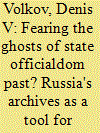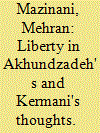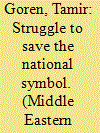|
|
|
Sort Order |
|
|
|
Items / Page
|
|
|
|
|
|
|
| Srl | Item |
| 1 |
ID:
142766


|
|
|
|
|
| Summary/Abstract |
The article examines the size, structure, composition and modi operandi of the Arab military forces which fought the Jews in the 1948 war, before the invasion of the Arab regular armies, based first and foremost on the Arab sources themselves. An attempt is made to assess the substantial reasons behind the Arab defeat in the first ‘civil war’ phase of the campaign, including a comparison of the number of combatants, which also explains the outcome.
|
|
|
|
|
|
|
|
|
|
|
|
|
|
|
|
| 2 |
ID:
142768


|
|
|
|
|
| Summary/Abstract |
This article investigates the work of a Lebanese non-governmental organization (NGO) called the Committee of the Parents of the Missing and the Disappeared. Although the successive Lebanese governments, most political leaders, ex-militia leaders and ex-combatants did not want to help in revealing the truth about what had happened to the people who went missing during the Lebanese civil war of 1975, the Committee managed to mobilize the families of the missing people under one banner for more than 30 years and was successful in making the Lebanese government and the legal authorities take few but important decisions that favoured the cause of the families of the missing people. It managed to do so without being deterred by the social, political and economic challenges it faced and due to the ability of its leadership to clearly define the sources of contention it wanted to protest against and by selecting the protests methods that best serve its cause.
|
|
|
|
|
|
|
|
|
|
|
|
|
|
|
|
| 3 |
ID:
142764


|
|
|
| 4 |
ID:
142765


|
|
|
|
|
| Summary/Abstract |
Writing in 1929, Edward Mead Earle opens his article with a striking remark about American missionary activities in the Near East: ‘No other American activity in the Near East has been of such extent and consequence as Christian missions. No other has been so long and so earnestly supported by so numerous and so influential a constituency at home. No other has made such persistent claims upon Christian Americans for financial assistance and upon the Government of the United States for diplomatic support.’ Once missionary activities in the East are examined, it becomes clear that Earle's statement was not an exaggeration. For example, an Ottoman minister of education, Zuhdu Pasha, reports, in a somewhat alarmed tone, that hundreds of missionary schools, including 400 Protestant ones had been operating in different parts of the empire in the 1880s. Next to schools, tens of missionary-run hospitals, orphanages, and printing presses had been active all over the empire, carrying the western material and spiritual values to the Ottoman society.
|
|
|
|
|
|
|
|
|
|
|
|
|
|
|
|
| 5 |
ID:
142763


|
|
|
|
|
| Summary/Abstract |
The overarching task of this article is to directly present the main crucial venues – a prototype road map of Russia's study of Persia in the context of foreign policy – to the students of Russia and its relations with Persia, as well as, more specifically, to researchers of Russia's late Imperial and early Soviet policy towards Middle East and Oriental studies therein. Simultaneously, taking into consideration the equivocal and quite often controversial nature of conducting archival research in Russia, it is worth knowing that a scholarly activity, seemingly conventional and rather straightforward in the West, can turn into an adventurous quest in present-day Russia, hampered by various factors. So the article also touches upon the current condition of the archival industry in present-day Russia, with the emphasis on the traditionally most burning issue in this field, namely the unjustifiably excessive secrecy, underpinned by the discourse of protecting Russian state interests, which can turn out to be an unexpected obstacle to research into a period even dating back a hundred years.
|
|
|
|
|
|
|
|
|
|
|
|
|
|
|
|
| 6 |
ID:
142762


|
|
|
|
|
| Summary/Abstract |
Here I examine the modern idea of liberty in works of Akhundzadeh and Kermani – two leading Iranian intelligentsia under the Qajar Iran (1794–1925). In doing so, first, I set forth a brief (intellectual) background that shows some of the influences of Iranian, Russian, and European scholars on Akhundzadeh and Kermani. Then, their thoughts will be represented systematically by following a simple theoretical framework driven from their works. Applying one model to both cases particularly helps to demonstrate their similarities and differences, as well as how fundamentally different was their understanding of liberty from their contemporaries. To Akhundzadeh and Kermani, life under the Qajars resembled the lawless state of nature, transcending which, however, required more than establishing laws. For the transcendence to occur, a revolution in mind was needed; and for that matter to happen, liberty was a critical prerequisite and consequence.
|
|
|
|
|
|
|
|
|
|
|
|
|
|
|
|
| 7 |
ID:
142767


|
|
|
|
|
| Summary/Abstract |
The aim of this paper is to describe and analyse the royal harem and its functions during the reign of Naser al-Din Shah Qajar (r. 1848–96), on the basis of two independent Persian-language sources written by noble Iranian women at the turn of nineteenth and twentieth centuries: Naser al-Din's daughter, Taj al-Saltana (1884–1936), who in her famous memoirs vividly rendered her early years spent on her imperial father's court, and ‘Lady from Kerman’ (whose identity remains, for the moment, unclear), who authored a latterly published travelogue of pilgrimage to Mecca and the holy Shi'a places in contemporary Iraq held by her in the early 1890s. The second part of the latter account is entirely dedicated to the sojourn in Tehran, where, upon coming back from the sacred journey, the woman was a frequent guest at the royal harem. Both accounts are unique as they are the only known first-hand sources penned by the female insiders of the harem in nineteenth-century Iran. Furthermore, both authors, who actually met each other, describe the same figures and events – which provide an opportunity to compare their relations and augment our knowledge about Iran in the late Naseri period.
|
|
|
|
|
|
|
|
|
|
|
|
|
|
|
|
| 8 |
ID:
142761


|
|
|
|
|
| Summary/Abstract |
The outbreak of the Arab revolt marked the start of the continuous economic decline of Jaffa, which hitherto had been known as an outstanding and flourishing economic centre. The decisive factor that highlighted above all others the city's economic deterioration was the decline of its port. This carried notable moral implication for the Arab public, as Jaffa port, the city's symbol and legacy, was deemed a national emblem and a foundation stone of the Palestinian Arab economy. Its decline from 1936 onwards instigated a bitter struggle to restore it to its halcyon days. The article examines the measures taken by the local Arab leadership bodies and by the Arab Higher Committee to resurrect the port and its status, from the outbreak of the 1936 disturbances until the war that broke out in 1947.
|
|
|
|
|
|
|
|
|
|
|
|
|
|
|
|
|
|
|
|
|